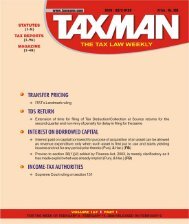CPT V24P7-Art1 (Content).pmd - Taxmann
CPT V24P7-Art1 (Content).pmd - Taxmann
CPT V24P7-Art1 (Content).pmd - Taxmann
You also want an ePaper? Increase the reach of your titles
YUMPU automatically turns print PDFs into web optimized ePapers that Google loves.
Direct Tax Laws<br />
as deduction under section 37(1), if the same<br />
is against the law and prohibited by law or<br />
where expenditure incurred by an assessee is<br />
not wholly and exclusively for the business<br />
purpose of the assessee.<br />
Now the question arises to what extent and<br />
under what circumstances can the expenditure<br />
incurred in a criminal proceeding or other<br />
litigation related to any business be allowed<br />
as deduction under section 37(1)? This article<br />
attempts to outline and consolidate the principles<br />
to be kept in mind for deciding as to whether<br />
certain expenditure on litigation can be allowed<br />
as deduction under the scheme of the Act?<br />
EXPENDITURE WHEN DEDUCTIBLE?<br />
2. Profits and gains of business expenditure,<br />
in the commercial sense, whether specifically<br />
provided for or not, may also be deducted<br />
under section 37(1) itself. 2 An amount would<br />
be deductible under section 37(1) only where<br />
it is an expenditure connected with or arising<br />
out of trade or is a commercial loss. 3 To be<br />
deductible, a business expense must be both<br />
ordinary and necessary, though need not be<br />
indispensible to be considered necessary.<br />
Legitimacy or necessity for expenditure cannot<br />
be probed into. 4<br />
To be an allowable expenditure under section<br />
37(1), the money paid out or away must be:<br />
(a) paid out wholly and exclusively for the<br />
purpose of the business or profession; and<br />
further, (b) must not be: (i) capital expenditure;<br />
(ii) personal expense; or (iii) an allowance of<br />
the character described in sections 30 to 36<br />
and section 80VV. 5 Apart from these prequalifications,<br />
the expenditure should not be<br />
caught by the mischief of the Explanation to<br />
section 37(1).<br />
EXPENDITURE INCURRED ON<br />
DEFENDING EMPLOYEES IN CRIMINAL<br />
PROCEEDINGS<br />
3. In J.N. Singh & Co. (P) Ltd. v. CIT 6 , it has<br />
been held that the expenditure incurred to<br />
646<br />
August 1 to 15, 2012 u TAXMANN’S CORPORATE PROFESSIONALS TODAY u Vol. 24 u 26<br />
defend assessee’s employee against criminal<br />
prosecution with regard to a transaction carried<br />
out in the ordinary course of business will be<br />
business expenditure and allowable as deduction.<br />
In J.B. Advani & Co. Ltd. v. CIT 7 and Excess<br />
Profits Tax, the assessee was a trading Private<br />
Ltd. Company in which Director had a controlling<br />
interest. The assessee’s director and manager<br />
were prosecuted for offences under the Hoarding<br />
and Profiteering Prevention Ordinance and<br />
Defence of India Rules. The expenses incurred<br />
in “successfully defending” them were held to<br />
have been incurred wholly and exclusively for<br />
the purpose of assessee’s business and were<br />
allowable deductions under section 10(2)(xv)<br />
of the Indian Income-tax Act, 1922.<br />
In CIT v. National Rayon Corpn. Ltd. 8 it has<br />
been held that where the assessee is an individual<br />
or a firm and incurs expenditure in defending<br />
the assessee-owner or a partner, it incurs the<br />
expenditure not wholly and exclusively for its<br />
business. The company protects its business<br />
interests and goodwill in such situations and<br />
the expenditure could be said to be wholly<br />
and exclusively incurred for the purposes of<br />
its business.<br />
In I.C.B. Ltd. v. ITO [2005] 93 ITD 418 (Mum.)<br />
the expenditure was incurred to defend the<br />
employees from criminal proceeding. It was<br />
held that the criminal act, did not seem to be<br />
for the purpose of ‘carrying on assessee’s<br />
business, nor did the same seem to be incidental<br />
thereto. Incurring of expenditure for defending<br />
an employee from criminal proceeding/<br />
prosecution for activities which are violative<br />
of or in contravention of the provisions of law<br />
tantamounts to incurring of expenditure for a<br />
purpose which is an offence or which is<br />
prohibited by law. Under Explanation to section<br />
37(1), the same shall be deemed to have not<br />
been incurred for the purpose of business or<br />
profession and, in turn, no deduction in respect<br />
of such an expenditure will be allowable. Relying<br />
on Haji Aziz & Abdul Shakoor Bros. v. CIT<br />
[1961] 41 ITR 350 (SC) decision, the expenditure<br />
was not allowed as deduction.











![“FORM NO. 3CEB [See rule 10E] Report from an ... - Taxmann](https://img.yumpu.com/45480232/1/190x245/form-no-3ceb-see-rule-10e-report-from-an-taxmann.jpg?quality=85)





